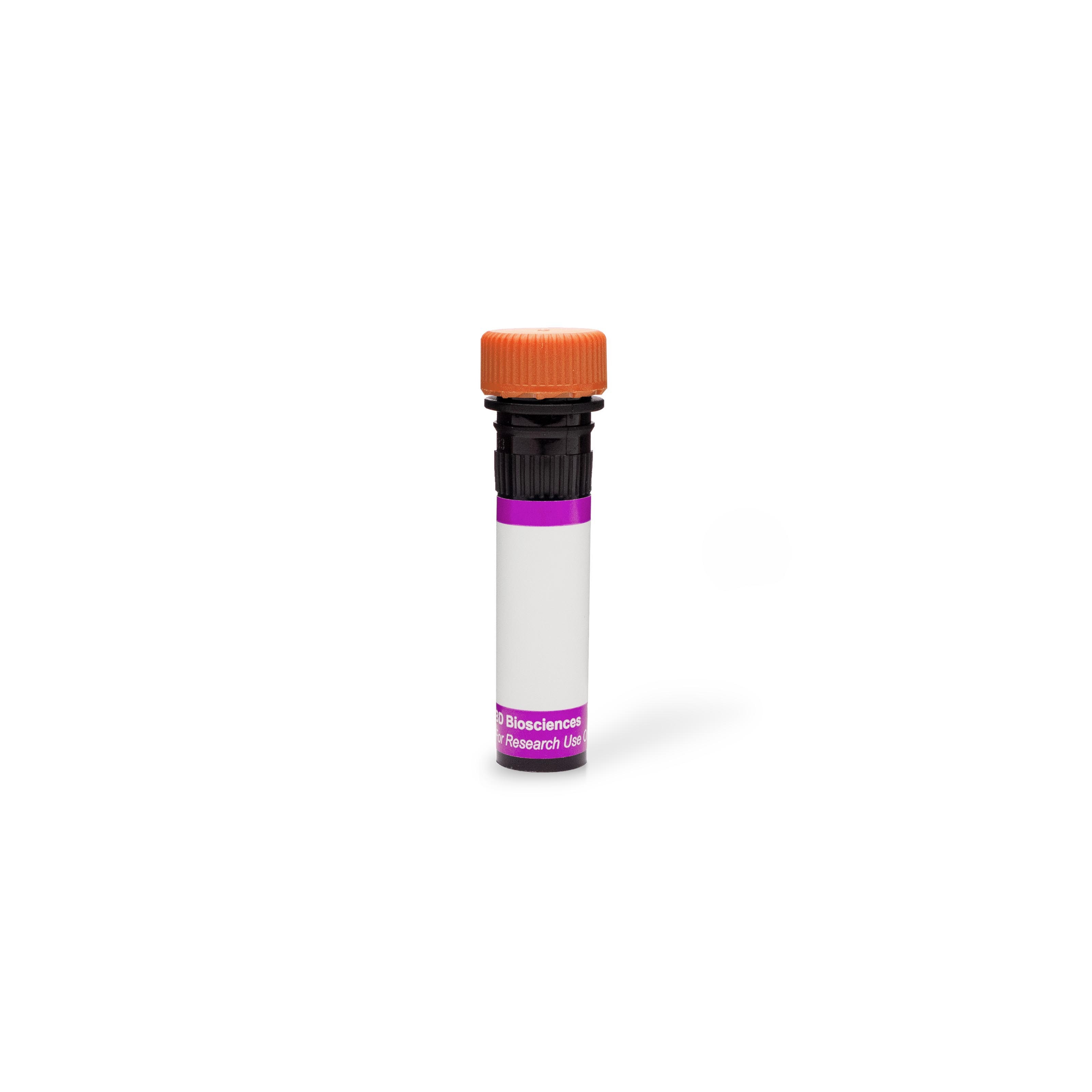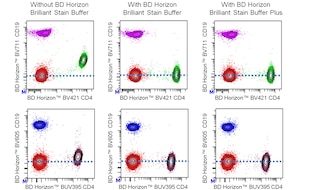Old Browser
This page has been recently translated and is available in French now.
Looks like you're visiting us from {countryName}.
Would you like to stay on the current country site or be switched to your country?


Regulatory Status Legend
Any use of products other than the permitted use without the express written authorization of Becton, Dickinson and Company is strictly prohibited.
Preparation And Storage
Recommended Assay Procedures
BD® CompBeads can be used as surrogates to assess fluorescence spillover (compensation). When fluorochrome conjugated antibodies are bound to BD® CompBeads, they have spectral properties very similar to cells. However, for some fluorochromes there can be small differences in spectral emissions compared to cells, resulting in spillover values that differ when compared to biological controls. It is strongly recommended that when using a reagent for the first time, users compare the spillover on cells and BD® CompBeads to ensure that BD® CompBeads are appropriate for your specific cellular application.
For optimal and reproducible results, BD Horizon Brilliant™ Stain Buffer should be used anytime BD Horizon Brilliant dyes are used in a multicolor flow cytometry panel. Fluorescent dye interactions may cause staining artifacts which may affect data interpretation. The BD Horizon Brilliant Stain Buffer was designed to minimize these interactions. When BD Horizon Brilliant Stain Buffer is used in in the multicolor panel, it should also be used in the corresponding compensation controls for all dyes to achieve the most accurate compensation. For the most accurate compensation, compensation controls created with either cells or beads should be exposed to BD Horizon Brilliant Stain Buffer for the same length of time as the corresponding multicolor panel. More information can be found in the Technical Data Sheet of the BD Horizon Brilliant Stain Buffer (Cat. No. 563794/566349) or the BD Horizon Brilliant Stain Buffer Plus (Cat. No. 566385).
Product Notices
- The production process underwent stringent testing and validation to assure that it generates a high-quality conjugate with consistent performance and specific binding activity. However, verification testing has not been performed on all conjugate lots.
- Please refer to www.bdbiosciences.com/us/s/resources for technical protocols.
- Since applications vary, each investigator should titrate the reagent to obtain optimal results.
- An isotype control should be used at the same concentration as the antibody of interest.
- Please observe the following precautions: Absorption of visible light can significantly alter the energy transfer occurring in any tandem fluorochrome conjugate; therefore, we recommend that special precautions be taken (such as wrapping vials, tubes, or racks in aluminum foil) to prevent exposure of conjugated reagents, including cells stained with those reagents, to room illumination.
- Caution: Sodium azide yields highly toxic hydrazoic acid under acidic conditions. Dilute azide compounds in running water before discarding to avoid accumulation of potentially explosive deposits in plumbing.
- For fluorochrome spectra and suitable instrument settings, please refer to our Multicolor Flow Cytometry web page at www.bdbiosciences.com/colors.
- CF™ is a trademark of Biotium, Inc.
- Although every effort is made to minimize the lot-to-lot variation in the efficiency of the fluorochrome energy transfer, differences in the residual emission from BD Horizon™ BV421 may be observed. Therefore, we recommend that individual compensation controls be performed for every BD Horizon™ BV605 conjugate.
- Human donor specific background has been observed in relation to the presence of anti-polyethylene glycol (PEG) antibodies, developed as a result of certain vaccines containing PEG, including some COVID-19 vaccines. We recommend use of BD Horizon Brilliant™ Stain Buffer in your experiments to help mitigate potential background. For more information visit https://www.bdbiosciences.com/en-us/support/product-notices.
- Please refer to http://regdocs.bd.com to access safety data sheets (SDS).
- For U.S. patents that may apply, see bd.com/patents.
Companion Products






The P6-1 monoclonal antibody specifically recognizes the extracellular region of Human Epidermal Growth Factor Receptor 4 (HER4). HER4 is encoded by ERBB4 (erb-b2 receptor tyrosine kinase 4). HER4 (ErbB4) belongs to the epidermal growth factor receptor subfamily within the ERBB family of Receptor Tyrosine Kinases (RTK) that includes HER1 (EGFR), HER2 (ErbB2), and HER3 (ErbB3). HER4 (ErbB4) is an ~180 kDa type I transmembrane glycoprotein that contains an extracellular ligand-binding region, a transmembrane sequence, and a cytoplasmic tail with the active tyrosine kinase domain. This RTK functions in a variety of normal cellular processes including proliferation, differentiation, migration, survival, and apoptosis that are often dysregulated in cancer cells. HER4 (ErbB4) is prominently involved in regulating the development and maintenance of the heart, central nervous system, and mammary gland. Upon binding ligands, including neuregulins and EGF family members, HER4 (ErbB4) can homodimerize or heterodimerize with other family members and transmit intracellular signals involved in initiating and regulating cellular responses. High expression of ERBB4 occurs in brain, heart, kidney, and heart as well as skeletal muscle, bone marrow mesenchymal stem cells and breast tissue. Overexpression of and mutations in the ERBB4 gene have been associated with some leukemias, neuroblastomas, and carcinomas. The P6-1 antibody can reportedly suppress Neuregulin-1 (NRG-1)-dependent signaling and colony formation responses mediated through HER4 (ErbB4) expressed on human breast cancer cell lines.

Development References (5)
-
Brockhoff G. "Shedding" light on HER4 signaling in normal and malignant breast tissues.. Cell Signal. 2022; 97:110401. (Biology). View Reference
-
Mota JM, Collier KA, Barros Costa RL, et al. A comprehensive review of heregulins, HER3, and HER4 as potential therapeutic targets in cancer.. Oncotarget. 2017; 8(51):89284-89306. (Biology). View Reference
-
Okazaki S, Nakatani F, Masuko K, et al. Development of an ErbB4 monoclonal antibody that blocks neuregulin-1-induced ErbB4 activation in cancer cells.. Biochem Biophys Res Commun. 2016; 470(1):239-244. (Immunogen: ELISA, Flow cytometry, Functional assay, Inhibition, Neutralization). View Reference
-
Sato T, Yoo S, Kong R, et al. Epigenomic Profiling Discovers Trans-lineage SOX2 Partnerships Driving Tumor Heterogeneity in Lung Squamous Cell Carcinoma. Cancer Res. 2019; 79(24):6084-6100. (Clone-specific). View Reference
-
Vollmann-Zwerenz A, Diermeier-Daucher S, Wege AK, et al. Multichromatic phenotyping of HER receptor coexpression in breast tumor tissue samples using flow cytometry--possibilities and limitations.. Cytometry A. 2010; 77(4):387-98. (Biology). View Reference
Please refer to Support Documents for Quality Certificates
Global - Refer to manufacturer's instructions for use and related User Manuals and Technical data sheets before using this products as described
Comparisons, where applicable, are made against older BD Technology, manual methods or are general performance claims. Comparisons are not made against non-BD technologies, unless otherwise noted.
For Research Use Only. Not for use in diagnostic or therapeutic procedures.